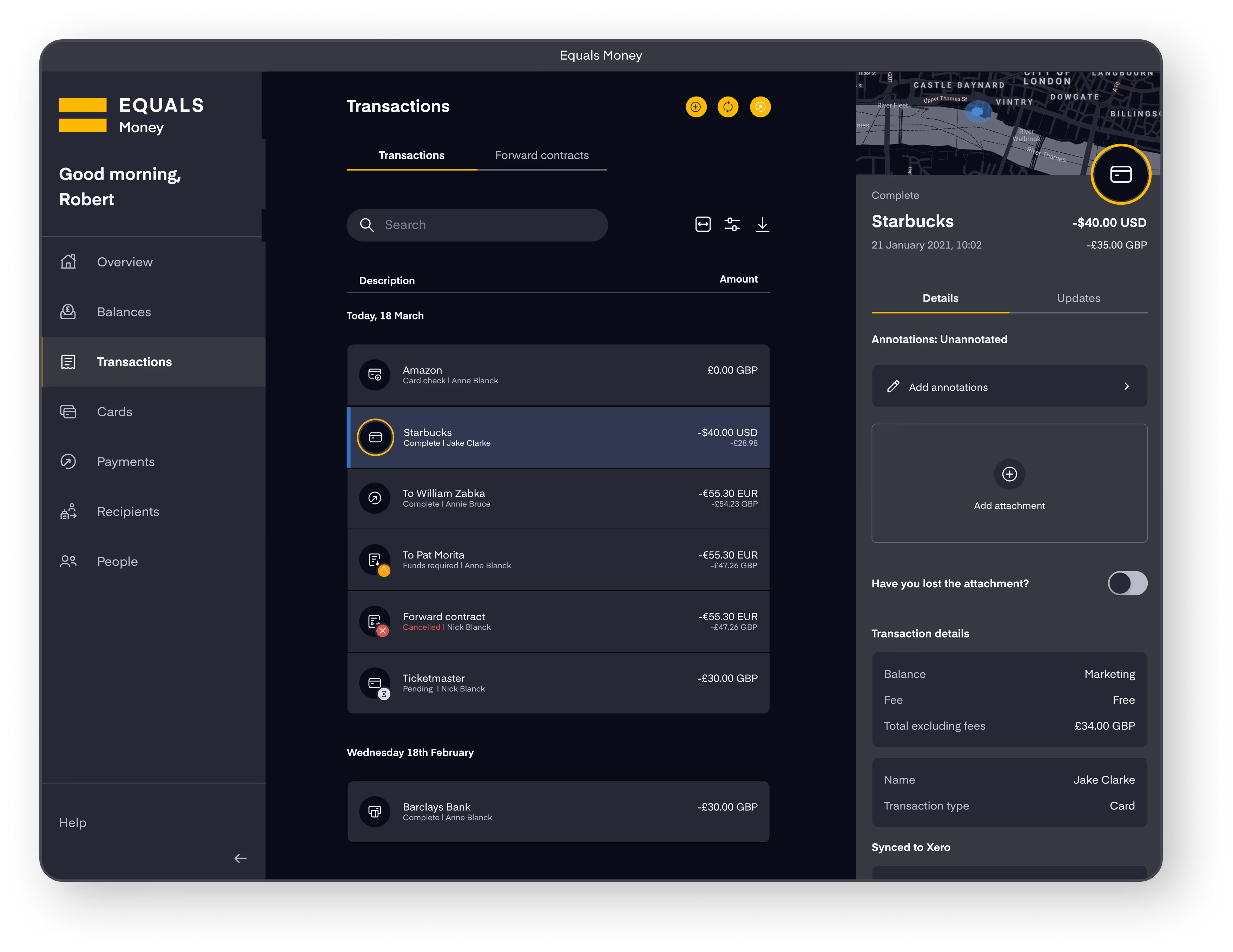How to view transactions and export reports
How can you view transactions?
The transaction page displays both card spend and payments. You can access the transactions page using the side menu.

Your transactions are listed in date order, with the most recent at the top.

You’ll see these details about your transactions:
- Description: This label is provided by the merchant or recipient. It will include the name of the payee.
- Name: This is the name of the person who made the transaction on your account. For incoming payments this is empty.
- Balance: This is the name of the Balance that the funds have been debited from.
- Type: This can be - Payment, Credit, Exchange, Deposit, Drawdown, Fee, Card, Card check, Card refund, Cash withdrawal
- Amount: The value of the transaction in the currency it was paid in. In the case of an exchange or a payment with an exchange, the other currency value will also be noted.
View transactions for a specific card, by going to the “Cards” page and selecting a specific card. A panel will appear on the right. Near the bottom of this panel, there is an option to “View transactions for [name on card]”.
Which transactions can you view?
Depending on your role, you may not be able to see all the transactions that your organisation has made.
These roles can see all transactions:
- Owner
- Admin
- Payer
- Viewer
- Accountant
If you do not have one of these roles, you can only see transactions from Balances which you have a Balance role for.
Recommended article: Assigning people to balances
You will need one of these roles to see transactions (or one of the account roles listed above):
- Balance admin
- Balance payer
- Balance viewer
You will always be able to see your own transactions.
Filtering transactions
Please click the slider icon at the top right to filter transactions.

You can choose to filter your transactions by:
- Date
- Transactions status (pending, declined, needs approval, open complete, funds requires, cancelled)
- Transaction type (payment, exchange, drawdown, card, card refund, credit, deposit, fee, card check, cash withdrawal)
- Balance
- Attachment status (one, lost, included)
- Annotation status (none, draft, submitted)
Transaction status
You’ll see that each transaction has a different status:
Pending
These could be card transactions that haven’t been fully processed by the merchant, or exchanges. Payments and deposits which have debited a balance but have not been completed yet will also show as pending.
Complete
These could be card transactions that have been fully processed by the merchant, or other types of orders (payments or exchanges) that have been completed.
Declined
Card transactions that have been declined
Funds required
Transactions that are pending until money is added to funds the transaction.
Needs approval
Transactions that are pending until the spend is approved. This will only appear if your account has the payment approval feature turned on, requiring approval of all outbound payments.
Open
This only applies to forward contracts. Once a forward contract has been booked and the deposit paid, the order will be displayed as open until payment is complete.
Search for the transactions you want to see
It’s also possible to search for the transactions on a specific card (physical or virtual) by typing the last four digits of the card number into the search bar on the transactions screen.

Four different types of reports
You can export a range of reports to support month-end reporting, audits, and day-to-day visibility. Reports are available in PDF and CSV (spreadsheet) formats. Choose from Statement PDF, Statement CSV, Transaction activity CSV, or Balance statement CSV.
The table below explains what each one is and when to use it.
What do you need?
- An clean, shareable statement for one balance: Use Statement PDF.
- Detail on completed transactions: Use Statement CSV.
- Details on every transaction, including completed, pending, declined, and cancelled: Use Transaction activity CSV.
- Total opening and closing amounts and total credits and debits: Use Balance statement CSV.
How to export each report
Statement PDF
Transactions > select download icon (top right) > Statement > PDF > set date range, Balance, currencies > select “Get statement”.
Statement CSV
Transactions > select download icon (top right) > Statement > CSV > set date range, Balance(s), currencies > select “Get statement”
Transaction activity CSV
Transactions > set transaction filters on page (status, type, attachments, annotations, Balance) > select download icon (top right) > Transaction activity > set date range > select “Get transactions”
Balance statement CSV
Balances > download (top right above tiles) > set date range > select “Export to email”















